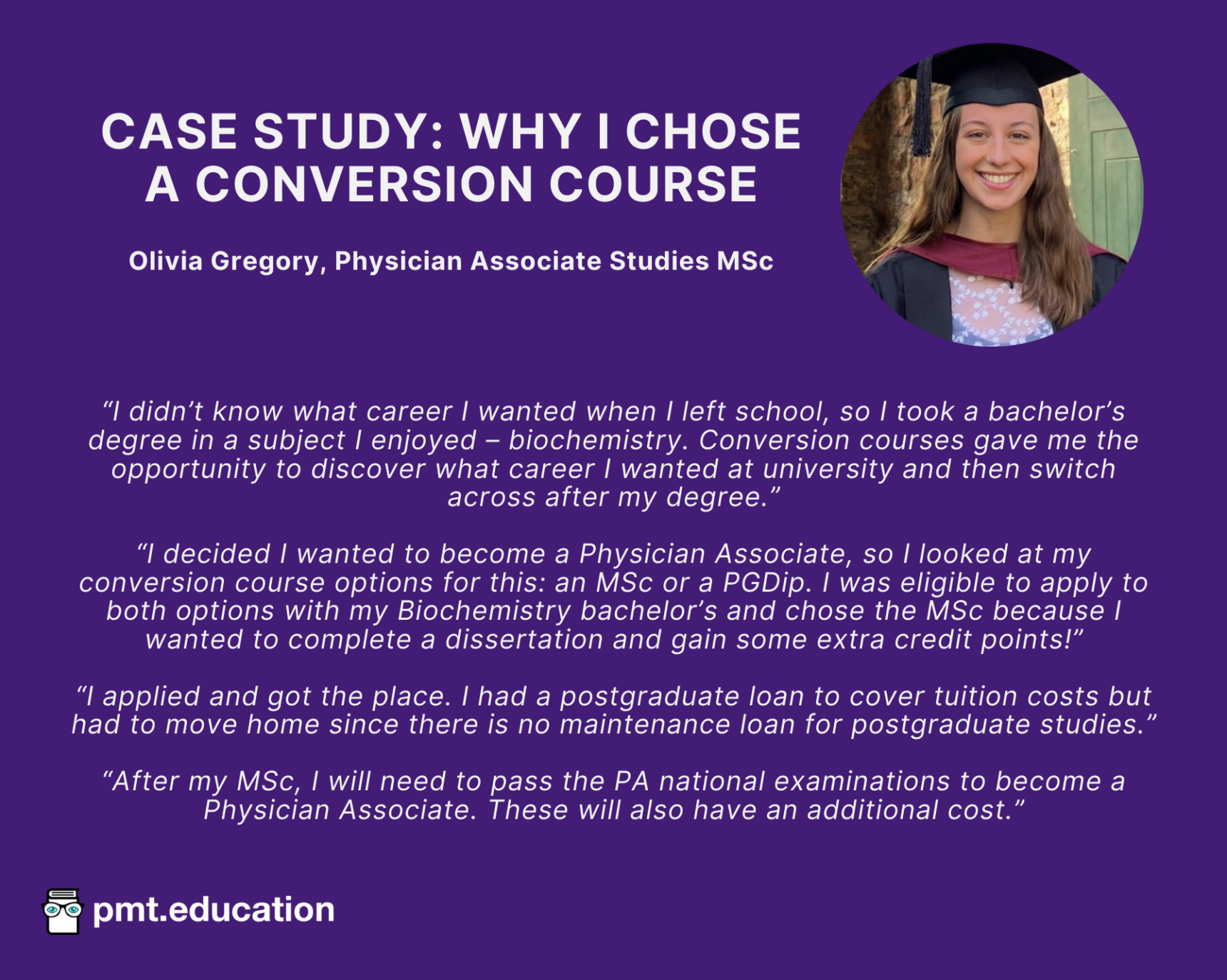Contents:
Qualification Level: Both undergraduate and postgraduate (Level 6 or 7)
Entry Requirements: Bachelor’s degree in unrelated field, sometimes professional experience required
Cost: Tuition fees, vary by location of residence and location of study
Assessment Methods: Varies but normally less exam-focused
Skills Developed: New subject knowledge, adaptability
Career opportunities: Entry into new career paths or bridge to further study
What are conversion courses?
A conversion course is a qualification open to graduates who have previously studied in a different subject area. Some conversion courses are vocational, giving students access to a career-pathway that their undergraduate degree could not. Others are academic, enabling students to study areas unrelated to their undergraduate degree.
STEM conversion courses are designed for graduates who have changed their mind about their career path, are interested in learning about a new STEM subject, or who wish to apply their undergraduate STEM knowledge to a specific vocation (such as teaching). Navigating through the information on conversion courses can be tricky. In this article, we’ll clarify what conversion courses are available, which conversion course matches your goals, and key information you will need before applying.
What are the different types of STEM conversion course?
Conversion courses are offered at different qualification levels and given different titles to reflect this. Each conversion course variant is listed below and their differences are highlighted in the ‘key differences’ table.
Conversion courses providing graduates with an undergraduate (Level 6) qualification include:
- Graduate Diploma (GDip): Compresses a three-year undergraduate course into one year of study
- Graduate-entry programme: Reduces the equivalent undergraduate course by one year for graduates
Conversion courses providing graduates with a postgraduate (Level 7) qualification include:
- Postgraduate Certificate (PGCert): Short study of a subject at a higher level than undergraduate, with PGCert of Education (PGCE) being a very common example
- Postgraduate Diploma (PGDip): Longer study of a subject at a higher level, similar to a master’s, but without a dissertation
- Master’s conversions: Intensive, higher level study with a dissertation
Most conversion courses are available as full-time, part-time, and sometimes online study.
Top tip to top up
PGDips and PGCerts can be transferred into a master’s qualification by taking additional modules or completing a dissertation to earn enough credits to meet the master’s level requirements (refer to the table below for credit requirements).
Key differences between conversion course qualifications
Applying to a STEM conversion course
Conversion course applications can either be sent directly to the university or through UCAS. You can apply to most conversion courses at any point from your final year of a bachelor’s onwards, with many graduates opting to take time away from their studies first. The eligibility criteria of each conversion course will explain exactly when you can apply and what undergraduate qualification you will require.
How to choose the right conversion course
Almost 1500 conversion courses can be explored on the prospects comparison site. To narrow down the vast selection, you must first choose the field of study you wish to convert to. Then, investigate which qualification levels are available within that field.
Step 1: Choosing your field of study
In order to choose your field of study, you must know why you are converting.
If you are converting courses to follow a new career path, choose a vocational conversion course that either meets the qualification requirements for your desired role or provides access to the necessary qualification for that role.
This table shows examples of popular vocational STEM conversion courses by career:
| Ultimate STEM career | Conversion course name | Qualification type | Conversion entry requirement | Steps after conversion course |
|---|---|---|---|---|
| Chartered psychologist | Psychology conversion course | MSc/PGDip | Any bachelor’s degree | Complete an accredited psychology postgraduate |
| Chemistry teacher | Chemistry PGCE | PGCE | Chemistry bachelor’s degree | None |
| Data analyst | Data Analytics | MSc | Any bachelor’s degree | None |
| Doctor, vet or dentist | Medicine | Gaduate-entry course | Life or health sciences bachelor’s degree | Pass national exams |
| Life sciences and healthcare lawyer | Law conversion | GDip | Any bachelor’s degree | Solicitor or barrister’s qualification exam |
If you are converting to study a new subject area, you must look at conversion courses available in your new subject of interest. Examples of popular academic STEM conversion courses are shown in the table below.
| Subject area | Qualification type | Conversion entry requirement |
|---|---|---|
| Computing | MSc/PGDip/PGCert | Technology, engineering, or mathematics bachelor’s degree |
| Economics | MSc/GDip | Any bachelor’s degree |
| Civil engineering | GDip | Mathematics, physics or geology bachelor’s degree |
| Mathematics | GDip | Science or economics bachelor’s degree |
| Marine biology | PCert | Any bachelor’s degree |
Step 2: Choosing the right qualification type
The types of conversion courses available are limited by the field of study you choose. If you find you have several qualification options, consider factors like the course content, the course duration, and your future career goals to decide which one is the best fit for you
Top tips
Always check if your undergraduate degree meets the conversion course entry requirements. Not all STEM degrees qualify for every conversion course, and vocational conversion courses often require evidence of prior interest in your new field.
Check the accreditation and reputation of the university you are applying to. Certain job roles will require you to have an accredited degree (such as BPS accredited degrees for Psychology roles).
How much do conversion courses cost?
The cost of conversion courses can vary widely depending on the conversion course type, subject, and institution. Generally, you can expect to pay an average of around £9,250 per year of study, with shorter courses such as PGCerts typically costing less. On top of tuition fees, other costs should be included in your financial considerations, including:
- Application costs: Depending on the institution, there may be a small registration fee for submitted applications.
- Exam costs: Most degrees do not charge for examinations but it is important to check if any national examinations are required and what their cost is, particularly for vocational conversion courses.
- Maintenance fees: Most students move away from home to study. The cost of living should be included when considering the overall cost. This includes rent, bills, food, travel, and leisure.
- Additional costs: These may include books, equipment, laptops, printing, lab fees, and transport to placements.

Funding options
Funding options for conversion courses include government loans, scholarships, and bursaries. The funding options available depend on:
- Type of qualification: The government does not offer loans for all conversion courses. For example, master’s conversion courses are eligible for the postgraduate student loan of up to £12,471, whilst PGDips and PGCerts are not. See the table below for a comparison of government loans for conversion courses.
- Field of study: Subject or career-specific funding is available for many conversion courses, especially from the government for roles in which there are staff-shortages.
- The university: Specific universities will offer their own scholarships and bursaries. Most universities offer an ‘Alumni scholarship’, which is a reduction in tuition fees to students doing conversion courses at the same university as their bachelor’s degree. Make sure to investigate the requirements for your university’s alumni scholarship.
The standard funding available for each conversion course type is shown in the table below.
NHS bursaries (medicine only)
Return on investment
The return on investment of conversion courses can be evaluated qualitatively. This involves weighing up the overall course costs with potential future benefits:
- Career advancement: Conversion courses enable a career change into high-demand fields such as teaching, law, and medicine, which often come with salary increases and job security.
- Higher earning potential: Some conversion courses provide you with a postgraduate education, which tends to be correlated with higher employment rates and earning potential compared to graduates.
- Job satisfaction: Studying and working in a field that interests you is invaluable, so conversion courses that satisfy your interests are often considered a very worthy investment.

Whether you’re looking to change your career path or learn more about a new subject, a conversion course could be an excellent option. You should now have a clearer understanding of how these courses work and the different types available. With this knowledge, you’re well-equipped to start searching for the course that best suits your goals.
FAQs
What is a PGAward?
A postgraduate award (PGAward) is a short one-module postgraduate course that provides a formal recognition of postgraduate-level study (Level 7). It is often used by individuals who want to enhance specific skills for career development or explore a new field without committing to a longer course of study.
Is a PGCE a conversion course?
There is much disagreement about what constitutes a conversion course, so you may see variations in the options listed by different sources. Postgraduate Certificates of Education (PGCEs) are often excluded as they focus on applying a student’s existing bachelor’s knowledge to a teaching career rather than transitioning to a new subject. However, in this article, we’ve included all courses that offer the opportunity to shift into a new career or field of study, which is why PGCEs are also covered.
Should I do a law conversion as a STEM graduate?
Law conversions are a popular option for STEM bachelor’s graduates. This is partly because law encompasses several areas closely related to STEM fields, such as life sciences and healthcare law, drug patent law, and engineering law. Additionally, STEM graduates are highly valued by law firms for their transferable skills, including problem-solving, communication, analytical thinking, and technical expertise. Law conversion programs typically include Graduate Diplomas in Law (GDLs) or Postgraduate Diplomas in Law (PGDLs).
Is a PGDip the same as a GDip?
The terms ‘PGDip’ and ‘GDip’ are sometimes used interchangeably to refer to a postgraduate Level 7 conversion course. However, they are actually different qualifications. A GDip, or Graduate Diploma, is a Level 6 undergraduate qualification that condenses a three-year undergraduate degree into one year of study. In contrast, a PGDip, or Postgraduate Diploma, is a Level 7 postgraduate qualification that provides advanced knowledge in a new field at a higher academic level. Always verify the qualification level when considering GDip courses.

Comments